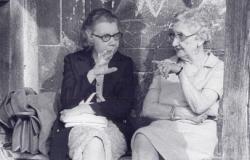A Treasure in Plain Sight: The Premise and The Promise of a Good Conversation

Hakan Altinay explores the transformative potential of conversations.
A conversation is a ubiquitous activity in which we engage without much reflection. It may nevertheless be worthwhile considering what exactly a conversation entails. Literary heavy weights such as David Whyte have opined that no one survives a real conversation unchanged; others such as Paulo Coelho note that, even though we no longer really take the time to listen and to talk, the most important thing in all human relationships is conversation. Etymology of the term points to turning together, or changing together. We can deduce that it takes more than one person to engage in this act, and that some change as a result of this act is not precluded, but rather anticipated.
The term used in Arabic, and also by Turks, muhabbet, has similarly telling etymological roots: Muhabbet is a derivative of h-b and h-b-b, which mean love and friendship respectively. A wholesome conversation is what takes place when couple of friends take a walk in the woods or in the bonhomie of the neighborhood café. Good conversations render participants as peers, and mitigate hierarchies. There is often a humility in good conversations, as they are predicated on curiosity, not knowing everything, and an eagerness to listen and to hear. That constellation of good faith, curiosity, and humility may be the most undercelebrated of our civic temperaments.
We can also inquire as to what is not a conversation. Clearly transactions are not conversations. Transactions are instrumental, while conversations need not be so. Transactions are fleeting, and offer no promise of evolving together. Neither have they any pretense of good faith beyond what the basest requirements of the law demand.(1)
Then, there is debate! While we exalt debate and debate clubs, this really is a suboptimal way to settle an issue. How can anyone take seriously a process in which one has no legitimate way of discovering and acknowledging valid points made by one’s opponent; change one’s mind; or seek a third position apart from the two diametrically-opposed positions delineated at the outset? This is an impoverished rendition of what we do in real life. Any civil exchange has to be predicated on the possibility that we may be influenced by our peers; the real possibility of evolving together is what distinguishes a genuine interaction from a banal transaction. This is why wise voices have argued that what we first and foremost owe to each other, by virtue of living together, is our good faith, our heed, and a genuine curiosity. Hopefully, many of us have known a few good people, who can see both sides of most arguments, and as such weave a civic fabric. The best of us are not partisans, but thoughtful sages. The rest of us are often at our best, when we address those thoughtful voices in our memory.
In her book, Reclaiming Conversation, Sherry Turkle describes conversation as leading to intellectual communion, where we render boundaries less impermeable. It is through conversations, and not through transactions and debates, that we discover we are in this together. Today, we live in a world where we are in it together with many more people than we had been for most of history. Yet, we have fewer conversations, and many more transactions. Could this be why we feel disoriented and out of our element?
Conversations involve listening, a grossly overlooked mode. Some have suggested that doctors do most of their healing by listening. Uruguayan sage Ernesto Galeano reported that the Mayans prized listening well as the criterion above all else, when it was time to choose a leader. This is an intriguing, almost counterintuitive, proposition, as locution and rhetoric are often more celebrated skills. Come to think of it, listening is not a passive act; it is not mere silence until it is our turn to speak. Good listening requires discernment. We can listen with the intent to respond, or we can listen with an intent to understand. It also involves demonstrating to the other party that they have been heard, and that their points of view have a real chance to be heeded. In Turkish, the literal translation of listening well is listening with your heart’s ear.
Listening well may be a more effective method of paving the way for civility than is talking well. Since Brexit and the election of Donald Trump as the US President, several explanations have been offered which focus on significant sections of the body politic and their overwhelming perception of not being heard or heeded. When not being listened to is your primary concern, you are tempted to seek attention by increasing your decibel level or opting for the most outrageous option. (2)
We know that humanity is capable of forging covenants not only via centralized punishment for noncompliance, but through communication. In 2009, Elinor Ostrom received the Nobel Prize in Economics for establishing this fact beyond doubt. In the public goods experiment, groups of five or more are given $100 each and are told that any sum they wish to contribute to a shared pot will be doubled and distributed evenly among all participants. If one trusts all the peers, the rational thing would be to put it all in, while if one does not trust others, the rational option would be to not make any voluntary contribution and simply enjoy any returns from the generosity of others. It turns out that the median initial contribution in these experiments is often one-third of the allowance. We also know that when played multiple rounds, contributions go down. Humanity is capable of a commitment to fairness, as demonstrated in the ultimatum game, but reacts strongly when the same pro-social inclination is abused. Further experiments have shown that allowing participants to communicate with each other, and establish covenants without swords, does work, and contributions do go up.
This finding is in line with a wave of contemporary social science. Yovel Harari, Joseph Henrich, and Michael Tomasello have argued convincingly that we enjoy the welfare and capabilities we currently have, not because we compete the best, but because we cooperate better than everyone else; communication is how we forge and sustain that cooperative vocation.
Other studies reinforce the hunch that communication is not simply a mechanical exchange of information. Arthur Aron has sensitized us to the magic of sustained, escalating, reciprocal self-disclosure. When we engage in self-disclosure, we potentially make ourselves vulnerable, but also signal our willingness to consider this a relationship. We trust our counterpart will validate the relationship and not abuse the newly acquired awareness of our vulnerability. Revealing and discovering that mutual vulnerability fosters closeness, as we become the co-authors of each others’ destinies and perspectives. History of interpersonal relations is the monumental proof of that proclivity and what it helps us achieve in terms of communion.
We have multiple testimonials about the power of that readiness to evolve together and to render the line between the other and one’s self less impermeable: When Amnesty Poland published the silent encounter of natives of and immigrants to Germany and Poland, where the participants simply stare into each other eyes, the 4-minute video went viral. After a Turkish photographer went around the country for seven years, taking pictures of 200 people from different ethnicities and walks of life, and exhibited the photographs through life-size prints, several visitors left in tears; remaining oblivious to other humans smiling and looking straight into your eyes seems not to be a viable option for many of us. Similarly, when StoryCorps allowed ordinary Americans to tell their stories and to be heard, many were reported to leave the recording booth in tears. StoryCops founder Dave Isay has described the whole affair in a book, tellingly titled Listening is an Act of Love. This may explain why it is so hard to hate someone once you have heard their story ‘through the ears of your heart’.
Yet, it is also true that sustaining curiosity is no simple task. Banaji and Greenwald have demonstrated how intensely our brains rely on generalizations, biases, and mindbugs as cognitive shortcuts, as well as how resilient these shortcuts turn out to be. Curiosity seems to be a muscle in constant risk of atrophy, and good muscle tone seems to require significant tenacity and perseverance. This may also be why it needs to be sautéed with more amiable and gratifying qualities of camaraderie. It is camaraderie that sooths and mitigates our survival anxieties, which are the root causes of restlessness and our addiction to cognitive shortcuts.
Others have found gaze or touch to be the main conduit through which we establish that we are interdependent and intertwined. Dan Siegel observed that the gaze of a child into the mother’s soothing eyes serves as the crucial instance of mutual rapport and affirmation. Many cultures validate the potency of gaze by seeking antidotes to evil eyes. We also know that infants who are fed well but are denied touch will be permanently hampered. It seems we crave, and thrive through, contact and engagement.
Even in the unlikely realm of international affairs, one can identify the opportunities created by listening well and talking better: When Kennedy acknowledged in 1963 that the Soviets paid a greater prize than anyone else in defeating the Nazis, he did something he need not have done in strictly instrumental and transactional terms. This was only nine months after the Cuban Missile Crisis and by all accounts, the prevailing mood in Washington should not have allowed a magnanimity of this kind. Yet, there is now a strong consensus regarding Kennedy’s actions paving the way to the first arms control deal between the Soviets and the US. Much like a full-bodied conversation, magnanimity nullifies tactical pettiness, forges us as peers, and as such unleashes a dizzying potential for what comes next.
In 1992, Bill Clinton made a similar move, when he argued that abortion ought to be safe, legal, and rare. The third adjective was not welcomed by feminists, but seems indispensable to me. By demonstrating to all that he heard the pro-life concerns and was not blasé about dilemmas that abortion presents, Clinton undid that Gordian knot.
A less-known yet equally spectacular act of listening generously is what the Polish Bishops did in 1965, when they wrote to their German counterparts offering and asking for forgiveness. The notion that even the grossly abusive party may need redemption and recognition is only possible through the recognition of utter humanity and interdependence with one’s nemesis. While no conclusive proof exists, one could postulate that the iconic kneeling of West German Chancellor Willy Brandt five years later did happen against the backdrop of that Polish magnanimity. In any event, we do know that Richard von Weizsacker did acknowledge Polish magnanimity in a similar landmark speech in 1984. It seems decency is something we achieve together.
Actions, such as those by Kennedy, Clinton, and the Polish Bishops, cannot be explained by assuming a transactional view of communication, but can only be rendered intelligible if we assume a richer understanding of a conversation where we affirm our interrelated nature, and the generous regard and good faith we extend to each other.
What does all this mean? I think it means we have to shed any notion that communication is a mechanical exchange of information. It is so clearly much more than that. Conversations are how we bond, and how we cooperate; they are the quintessential human activity. We have to be more reflective about the premise and the promise of a good conversation. In a twisted, perverse way, our world spends infinitely more time and energy on increasing the volume of transactions than it does on the quality of our conversations. Consider the available pool of advice on how best to negotiate and a close a deal versus the lengths we would need to go before we encounter any reflection regarding a good conversation.
Most critically, the gap between the conversations we do have and those we can have is greater than the gap between governance schemes we have and those we ought to have. If we close the conversation gap, a profoundly feasible goal, we may discover that several challenges -by no means all challenges but many more than we are made to assume- become more manageable. Either way, we are complicit in both the status quo and achieving the elusive goal of a better conversation. We are both the problem and the solution, and this is deeply refreshing.
Hakan Altinay is the President of the Global Civics Academy and the Director of the European School of Politics in Istanbul.
Photo credit: DSdriver via Foter.com / CC BY-NC
Notes
1) If in doubt, try reading Terms and Conditions that we need to consent to complete any daily task, and search for signs of good faith in that 8-point illegible and incomprehensible noise.
2) “Hillary Clinton and The Populist Revolt” by George Packer, The New Yorker.

